Family Life
The Beck Family
The Beck family 1920’s/1930’s. Written by Jack Beck (born 1923) in 1999.
Having been to see the wonderful display of photographs of old Upwey at the Old School Hall, I’m tempted to record a few of my memories of life in the village as it was in the 1920’s and 1930’s, with a few glimpses of some of the activities immediately after the second war.
I was born in Rose Cottage in 1923. Rose Cottage was then a small thatched cottage at the very top of Elwell Street at the junction with Roman Road (now called Ridgeway).
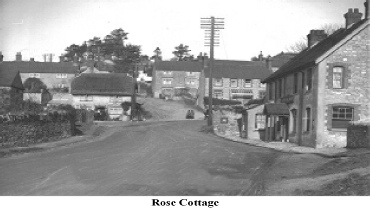 It has now been converted into a much larger and more modern house and the thatched roof is no longer there.
It has now been converted into a much larger and more modern house and the thatched roof is no longer there.
But I must have been very young when we moved to 3 Ropers Buildings, as I cannot remember life in Rose Cottage at all.
At the age of 4 I started at Upwey School – Upwey St Laurence C of E School as it was officially known – where the Infant’s class was taught by Miss Lunn from Martinstown. This good lady had a wonderful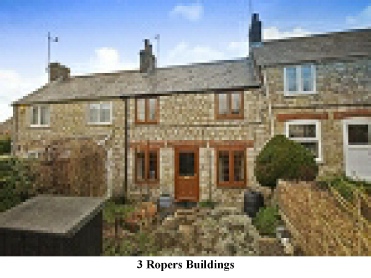 way with young children and was very popular. The other teachers at the school were Miss Ida Rogers, who took the middle classes and Mrs EM Dowden who was the head-
way with young children and was very popular. The other teachers at the school were Miss Ida Rogers, who took the middle classes and Mrs EM Dowden who was the head-
Having reached the top classes, we had a sports afternoon to look forward to as we would spend the last two hours of every Friday at ‘the top of Jim Willis’s’. Jim Willis owned Windsbach farm immediately opposite the school and our sports field was the flat ground at the very top of the steep hill behind his farmhouse. The boys would play football and the girls played rounders.
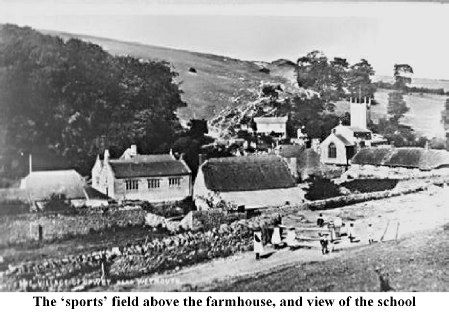
Because it was a Church school, the vicar, Rev AS Bryant, would visit regularly to give a pep-
Some of us joined the church choir, for which we received a little pay-
As children we would have to attend Sunday School at the village school at 10.30am and then go on to the church for the 11am service and in the afternoon we had to attend Sunday School at the church at 2.30pm. Then we were back in the choir for the 6.30pm evening service. From Ropers Buildings we would use the short-
Hurdlemead was also our playfield for evenings and holidays and we had great games of football there, with coats or jerseys laid down as goalposts. Summer cricket was played along one of the footpaths, with a lot of our playing time spend on hunting for lost balls in the stinging nettles under the hedges.
Our games came to an abrupt end when muck-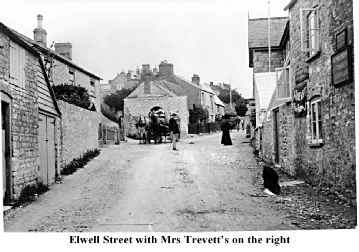
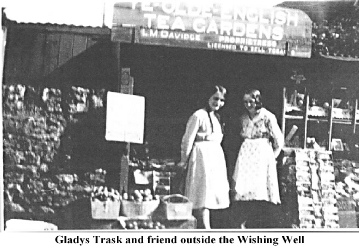
As schoolchildren, our favourite place for spending our ha’our ha’pennies was the sweet counter in the Wishing Well Tearooms, then owned by Mrs Davidge. If we couldn’t wait to get there, we’d call at Miss Samways’ shop at 84 Church Street (later Eckersall’s).
We would often pay a visit to George Vallance’s cobbler shop in Ben Trevett’s front garden (692 Dorchester Rd) to watch him repairing shoes and listen to his stories of the Great War. Even with his mouth full of brads he could hold us enthralled with his tales of heroic deeds. No doubt a lot of it owed more to theatre than to fact, but we loved it.
On one occasion he was making a pair of shoes to order, 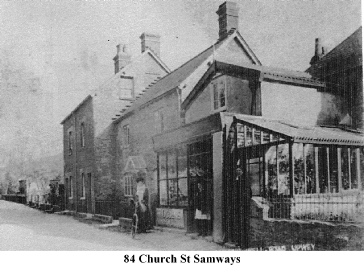 stitched throughout, and it fascinated us to see him waxing the thread by pulling it through a lump of wax held in one hand; the tread having been produced by plaiting together 3 or 4 thin strands by rolling under a flat palm along the thigh. The cobbler shop is still standing (1999), but the pavement door has been blocked off and the building used as a store shed.
stitched throughout, and it fascinated us to see him waxing the thread by pulling it through a lump of wax held in one hand; the tread having been produced by plaiting together 3 or 4 thin strands by rolling under a flat palm along the thigh. The cobbler shop is still standing (1999), but the pavement door has been blocked off and the building used as a store shed.
There were quite a few shops in Upwey at that time. 17 Elwell Street was a very busy post office with its own sorting office, from where at least two postmen would make two deliveries a day, on foot or bicycle. At 19 Elwell Street, Mrs Trevett had a little café where we could buy lovely home-
Bread from the bakery would be delivered locally by Eddie Carpenter, using a hand-
A favourite spot for boys to play in the 1930’s was the old lime pit and lime kilns at the rear of Roman Road (now Ridgeway). The actual buildings of the kilns were by then derelict, but wonderful for the games of adventurous lads. The smithy, just below was also an attraction to us, especially when horse-
The village cricket ground at the time was Virgin’s field at the very top of Chapel Lane, behind the old farm house. Always a cricket lover, I missed very few of the home games and would get involved in helping with the scoreboard, also with taking the cans down to the dairy to collect the milk for the tea-
The highlight of the year, for we youngsters, was the arrival in early November of Townsend’s Fair, which was set up in a field on the right hand side of Chapel Lane. Power for the roundabouts, fairground organ ad lighting was provided by drive belts attached to the steam engine ‘Queen Mary’. The same field would be used on occasions by a circus. The name Fossett’s comes to mind, but I couldn’t be sure.
We once joined up in play with the circus children and decided to go tree climbing. Further up Chapel Lane, just after the railway bridge there was a tall tree just made for climbing, so up we went. We thought we were the 'cat's whiskers' at th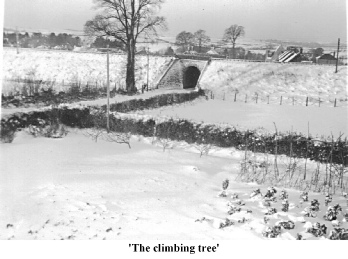 at game but the circus children went up and down like monkeys, so we had to rethink our techniques! The hurtful thing was that two of them were girls!
at game but the circus children went up and down like monkeys, so we had to rethink our techniques! The hurtful thing was that two of them were girls!
We were once stopped by a lady and told there was to be a children's meeting in a small marquee that had been erected in the field on the right at the bottom of Stottingway Street and that every child that attended would get a present. That was good enough for us, so off we went to join up with quite a few children who had already arrived there. Soon we were being preached at and singing about our 'cups being full and running over'. I can't remember what present I received but someone had a goldfish. We learned later that they had been a group of Evangelists, possibly Americans.
The rag and bone man was a regular visitor to the village and the housewives would sell him the rabbit skins that they had hung on the outside walls of the cottages to dry.
Another regular visitor was the scissor grinder, whose bicycle could be adapted so that the pedals could operate the grinding wheels.
Upwey Wishing Well Halte, beside the railway bridge on Ridgeway Hill, was very much in use in those days. The little tank engine, with two coaches, always referred to as the 'Motor' would stop at all of the halts between Weymouth and Dorchester or Yeovil. On Dorchester market days the Motor would do very good business.
The village lights were gas-
There was then, a stream that ran alongside the road for the whole length of Elwell Street which ran into another stream that ran along Church Street, disappearing underground near the Mason's Arms (now the Riverhouse).
We could earn a few pence on a Saturday morning collecting wireless accumulators from neighbours and taking them to Shepstone's Garage for recharging, always returning with a completely recharged one that had been collected the previous week. Shepstone's Garage had two petrol pumps on the forecourt that were operated by winding handles.
The social centre for the village was the WI Hut, right next to Shepstone's Garage. Meetings, whist drives, dances and concerts would all be held there. The concerts, which today would be described as 'corny' were good for a laugh, because something or other would go wrong. But some of the local talent was very good and much appreciated. Mr Newman, a shoe-
Another place to pass away an evening was the Reading Room, just inside the Elwell gate of Newclose. Being well-
Charlie Samways had a large paraffin store in the lane behind Miss Samways' shop (94/96 Church Street) and on one night a week we would go there to learn to box. The boxing gloves were supplied, but were a bit big for our small hands. We loved it there and could rely on Mr Samways to see fair-
Later on a few of us got permission to use the disused chapel on Bottom Road (Church Street) to do a bit of boxing. The chapel was used mainly by the boy scouts, under Captain Borradaile-
The Wolf Cubs, as they were then called, held their meetings in the then empty cottage opposite the entrance to Prospect Place. The cottage is attached to Yew Tree Cottage, then owned by the Saunt family. Miss Saunt was the cub leader.
The village policeman for many years was PC Fudge, who lived at 6 Prospect Place, and there wasn't much he didn't know about what we youngsters got up to. Later on my parents took over the tenancy of that house and for quite a while the tin plaque, high up on the back wall declared 'Dorset Police'.
A great attraction for the youngsters was the horse-
In the very early years of the Second World War a youth club was started by Kathryn Rogers, daughter of Ray and Mrs Rogers who had the dairy shop at the top of Jesty's Avenue. The club was very successful, with lots of members. The meeting place was the 'hole in the wall' as we called it; through a door built into the wall at the bottom of Broadwey Hill, on the opposite side of the road to the Temperance Hall. It had probably been a Reading Room at one time. We also held meetings at Broadwey School (opposite the church) where we also did some boxing. Alan Waugh and Peter Hopewell, who both lived along Redlands, were involved in the running of the club and Alan, who was at that time at university, attempted to introduce us to debating. But we just weren't up to it, as his first, and only attempt, was to prove. We were more inclined to argue with each other in a free-
The water meadow down in the dip, that one looks down on from the lower part of Ridgeway Hill, used to be mown by a lone scythe-
I can remember a particularly sad time, when two sisters died from consumption within a few weeks of each other. They were school friends of ours, Joyce and Winifred Davis who lived along the Dorchester Road nearly opposite the Royal Standard.
For many years our milk was delivered by Bert Legg, one of the five sons from Icen Farm in Bincombe Lane, who transported the churns on a platform built onto the side of a bicycle. He would bring a milk pail to the door and use measures that were clipped over the paid to supply the quantity required.
The branch line from Upwey Junction was very much in being then and the trains to and from Abbotsbury were a regular sight. I can remember using it only once for a journey to Portesham.
A certain gentleman who worked at Upwey Junction was a worry to us youngsters because of bad blood between him and our father. Well into the 1930's we were ordered never to speak to him other than to ask for our tickets. It resulted from something that happened during the General Strike of 1926 which upset the union men, and being 'sent to Coventry' -
Mr & Mrs Hyde ran the Royal Standard pub for many years and their eldest son Peter would organise little film shows in a loft at the back of the pub. He would charge one penny for the privilege of sitting on a tea chest to watch a Charlie Chaplain film. We youngsters thought it was wonderful as we hadn't by then been inside a cinema.
Our Sunday School outings were usually charabanc trips to Abbotsbury Beach. On the return journey on one occasion the charabanc failed to climb a steep hill and we all had to get out and give it a push. But that just provided extra excitement to the day. No claims for compensation at that time!
On Saturday mornings my brother Frank and I delivered meat for Mr Bowditch. His butcher shop in Elwell Street was just a passage-
After World War 2, an organisation was set up to oversee arrangements for what was to become Upwey's Big Affair. It was quite a gamble, but one that paid off handsomely. It was held in Hurdlemead, with the main attraction being a gymkhana of high standard, which was well supported by the local show-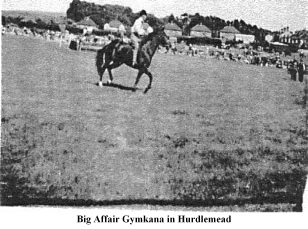 of the organising work was done by Mr Leslie Davis, who lived near Nottington Corner.
of the organising work was done by Mr Leslie Davis, who lived near Nottington Corner.
At about the same time, my parents re-
There was great sadness in the village on hearing of the deaths, in the early part of the war, of Jack Kingman and Peter Fellowes. Both were very popular lads and were on flying duties when they died.
I'm sure I shall think of many things I should have written about, but for the moment the memory has run dry. Perhaps others may be tempted to have a go.
Jack Beck.



